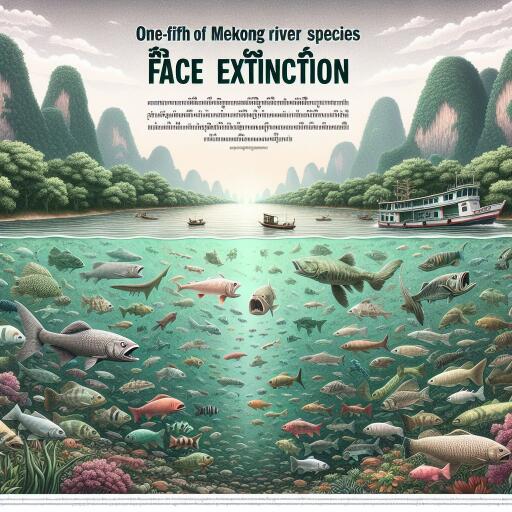
One-fifth of Mekong River Fish Species Face Extinction, Report Says
In an alarming revelation, recent studies have brought to light the critical endangerment facing the aquatic biodiversity of the Mekong River, one of the most biodiverse rivers in the world. According to a collaborative report by the World Wildlife Fund and twenty-five leading global conservation organizations, a multitude of threats is driving numerous fish species towards extinction. These threats include habitat degradation, agricultural encroachment upon wetlands, over-exploitation through unsustainable sand mining practices, the spread of invasive species, exacerbated impacts of climate change, and the segmentation of river flow due to hydropower dams.
Zeb Hogan, an esteemed fish biologist and leader of the Wonders of the Mekong project, emphasized the detrimental impact of hydropower development on the river’s ecological balance. Hydropower dams, particularly those constructed in the upper reaches of the river, are causing significant alterations to water flow, reducing water quality, and obstructing the natural migration patterns of fish. This phenomenon effectively disrupts the sediment transport system that is vital for the agricultural fertility downstream, particularly in the Mekong River Delta, influencing the livelihoods of millions who rely on this ecosystem.
A concerning statistic highlighted in the “The Mekong’s Forgotten Fishes” report is that approximately 19% of the 1,148 identified fish species within the Mekong Basin are on the brink of extinction. This figure is particularly startling considering the insufficiency of information regarding 38% of these species, which hinders accurate conservation status assessments. The list of critically endangered species includes the world’s largest catfish and carp varieties, as well as the giant freshwater stingray—illustrating the scale of potential loss to global biodiversity.
“The Mekong hosts some of the world’s most unique and large freshwater fishes, whose existence is now under threat,” Hogan stated, underscoring the significance of the Mekong’s biodiversity not just to local communities but to the global ecological heritage. The decline in fish populations is not merely an environmental concern but a socioeconomic one as well, given the river’s contribution of over 15% to the world’s inland fish catch, generating an income of over $11 billion annually. This loss threatens the food security and livelihood of at least 40 million people in the Lower Mekong Basin who depend heavily on these water resources.
Despite the grim outlook, experts like Hogan believe that there is still a window of opportunity to mitigate these impacts and conserve the river’s biodiversity. He advocates for a unified approach among the Mekong countries to adopt sustainable development practices that prioritize ecological integrity and community livelihoods. “It’s not too late to change course,” he remarked, emphasizing that collective action and sustainable management practices could potentially reverse the tide of biodiversity loss in the Mekong.
The urgency of this situation calls for immediate attention and action from both regional stakeholders and the global community. Concerted efforts towards sustainable development, habitat restoration, and strategic conservation initiatives are imperative to safeguard the ecological and economic stability of the Mekong River Basin. The plight of the Mekong’s fishes is a clarion call to prioritize biodiversity as a cornerstone of sustainable development, ensuring that this lifeline continues to sustain millions of lives and diverse ecosystems well into the future.





Leave a Reply